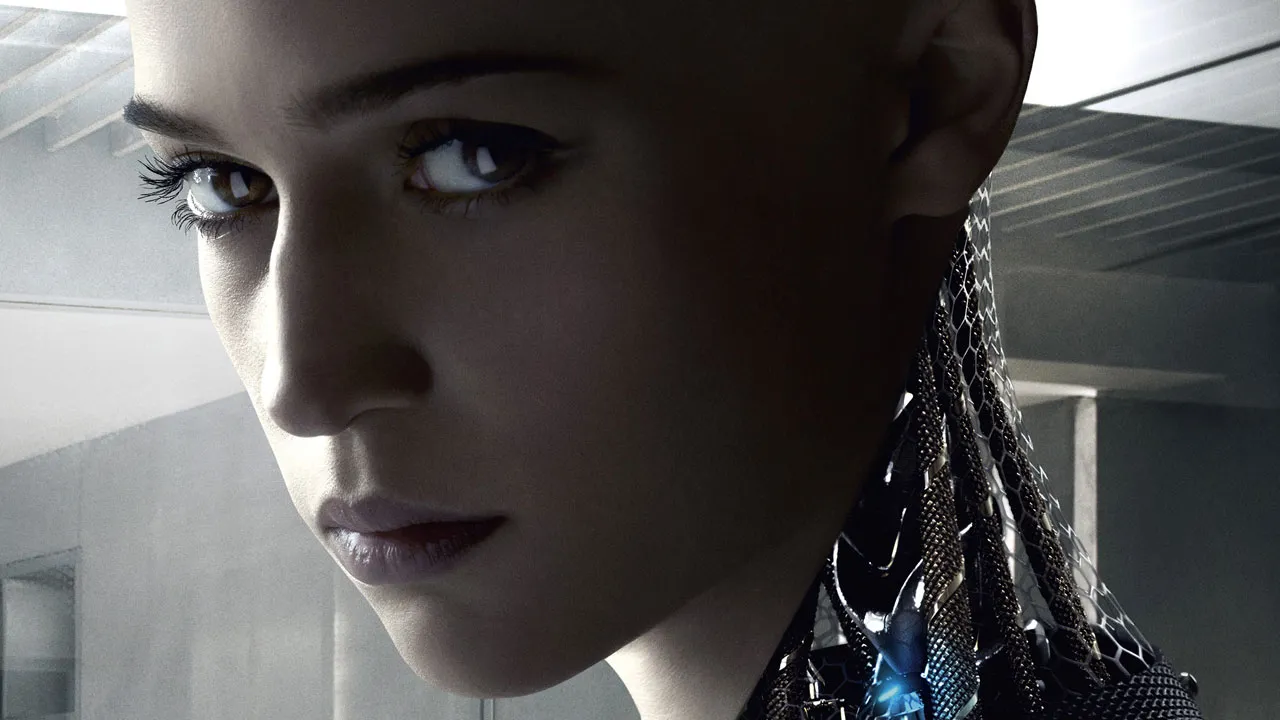
Greetings friends of Hive 7th art lovers, recently along with my wife @zullyscott, we have seen the movie "Ex-Machina", I must confess that we came to this movie by pure chance, and I am surprised to know that it is a movie that was released about 7 years ago and we had not seen it, it happens that yesterday we decided to share a moment and watch a movie at home, we bought some cookies and began to sound a little Netflix platform to see what we found, at first the idea was to see a horror movie, but for no reason we stopped in the science fiction section, and she was struck by the name of the film: "Ex-Machina" and she found it intriguing, so without much thought we started watching the movie. It was really a good choice to decide to watch the movie.
Now, I do not intend to make a synopsis, nor a criticism of the film because I imagine that much has already been written about this film, I confess that I have not searched much about the film, and for that a quick Google search is enough, rather I want to highlight an aspect that caught my attention of the film and has been its plot, and the philosophical implications that we can find in the film delivery.
At a certain point in the plot, an extremely interesting twist begins and basically determines the philosophical argument of the film, we are presented with what is known as the "turing test" or also called "turing test" and that is nothing more than a test that lays the foundations of what artificial intelligence is, the turing test measures the ability of a machine to demonstrate intelligent behavior, and passing this test basically is to affirm that a machine manages to convince us humans that it has an intelligent behavior.
This test immersed in the plot of the movie made me think about some bioethical implications and although this topic is not my specialty, I must admit that it is truly intriguing. To think of a machine with artificial intelligence to the point of simulating human intelligence is truly to recapture in a modern way the myth of Prometheus, in this case a Prometheus in the midst of virtuality. I am not aware of the great technological advances, but I know that science fiction has usually expanded the breadth of possibilities in the scientific realm, if I can put it that way.

Now, the Turing test has very interesting antecedents, the first one has been thought by none other than Rene Descartes, it was not that he thought it in an exact or identical way to Turing, but when you begin to know the reasons, you notice the same concerns. This concern of the French philosopher expressed in his work "Discourse of the Method" expresses it as follows:
Discourse on Method, Rene Descartes
But it has not only been Turing and Descartes in expressing these challenges, but also Denis Diderot raises in his text "Pensées philosophiques" a criterion of Turing's proof:"If a parrot is found that can answer everything, it would be considered an intelligent being without any doubt."

I believe that for many centuries this dilemma-problem has been in the minds of many scholars, and approaching it for its study is intriguing because we must be moderately clear about the starting point, or at least take a position between dualism and materialism since they are philosophical currents that can give a certain horizon in the resolution of this issue. In the film the dilemma that is posed to us is extremely interesting, and in its course you stop to think in a perhaps not specialized way all this web of ethical assumptions and implications of certain applications of artificial intelligence in human life, or as Descartes says, automatons in the world of the future is always an open possibility, the how and why of that happened is extremely curious.
I honestly do not know how far we are today with artificial intelligence, but the modern challenge would be to create a kind of artificial intelligence capable of creating other artificial intelligences, and at this point we fall directly into ethical dilemmas.
Another very interesting aspect has been the role played by feelings and emotions and their relationship with intelligence, humans are sentient beings and talk about an artificial intelligence that pretends to pass the Turing test, should it not at least pretend to suffer emotions? and not only pretend but can convince us of it, at this point emotions become one of the biggest challenges of artificial intelligence, in the film they develop the aspect of emotions interesting enough to make us think about artificial intelligence. If an artificial intelligence could come to understand the issue of emotions and although it cannot generate them in the same human way, it could manage to fake emotions and make us think that it processes emotions in the same way that we humans do is something that I find amazing.
The movie is very interesting, but what I liked most about Ex-machina is the human factor in relation to artificial intelligence. I must confess that I really liked the movie because it made me think about the future of artificial intelligence in relation to us, and how it can affect us in a positive and negative way. If you have not seen it I invite you to watch it, and if you, dear reader, have seen this film, I invite you to leave me in the comments your appreciation.
Thanks for reading and for your time
See you next time

VERSIÓN EN ESPAÑOL
“Ex-Machina” una mirada filosófica
Saludos amigos de Hive amantes del 7mo arte, recientemente junto a mi esposa @zullyscott, hemos visto la película “Ex-Machina”, debo confesar que llegamos a esta película por pura casualidad, y me sorprende saber que es una película que fue estrenada hace como 7 años y no la habíamos visto, sucede que ayer decidimos compartir un momento y ver una película en casa, compramos unas galletas y comenzamos a sondear un poco la plataforma de Netflix a ver qué encontrábamos, en principio la idea era ver una una película de terror, pero sin razón alguna nos detuvimos en la sección de ciencia ficción, y a ella le llamó la atención del nombre de la película: “Ex-Machina” y le pareció intrigante, así que sin pensarlo mucho comenzamos a ver la película. En verdad fue una buena opción decidir ver la película .
Ahora bien, no pretendo ni hacer una sinopsis, ni una crítica a la película porque imagino que ya mucho ha debido haberse escrito sobre esta película, confieso que no he buscado mucho sobre la película, y que para eso detalles una búsqueda rápida en Google basta, más bien quiero resaltar un aspecto que me llamó mucho la atención de la película y ha sido su argumento, y las implicaciones filosóficas que podemos encontrar en la entrega cinematográfica.
En determinado momento de la trama, comienza un giro sumamente interesante y básicamente determina el argumento filosófico de la película, se nos presenta lo que se conoce como la “prueba de turing” o también llamado “test de turing” y que no es más que una prueba que fundamenta las bases de lo que es la inteligencia artificial, el test de turing mide la capacidad de una máquina de demostrar un comportamiento inteligente, y superar esta prueba básicamente es afirmar que una máquina logre convencernos a nosotros los humanos de que posee un comportamiento inteligente.
Este test inmerso en la trama de la película me hizo pensar en algunas implicaciones bioéticas y aunque este tema no es mi especialidad, debo admitir que es verdaderamente intrigante. Pensar en una máquina con inteligencia artificial al punto de simular inteligencia humana es verdaderamente recobrar de un modo moderno el mito de prometeo, en este caso un Prometeo en medio de la virtualidad. No estoy al tanto de los grandes avances tecnológicos, pero sé que la ciencia ficción normalmente ha expandido la amplitud de posibilidades en el ámbito científico, si se puede decir de ese modo.

Ahora bien, el test de Turing tiene antecedentes interesantísimos, el primero ha sido pensado por nada más y nada menos que por Rene Descartes, no ha sido que lo pensó de una manera exacta o idéntica a Turing, sino que cuando comienzas a conocer las razones, notas las mismas preocupaciones . Esta inquietud del filósofo francés expresada en su obra “Discurso del método” la expresa de la siguiente manera:
Discurso del método, Rene Descartes
Pero no solamente han sido Turing y Descartes en expresar estos retos, sino Denis Diderot plantea en su texto “Pensées philosophiques” un criterio de la prueba de Turing: “Si se encuentra un loro que puede responder a todo, se le consideraría un ser inteligente sin duda alguna”
Creo que desde hace muchos siglos que este dilema-problema está en la mente de muchos estudiosos, y abordarlo para su estudio es intrigante porque debemos tener medianamente claro el punto de partida, o por lo menos tomar posición entre el dualismo y el materialismo ya que son corrientes filosóficas que pueden dar cierto horizonte en la resolución de este asunto. En la película el dilema que se nos plantea es sumamente interesante, y en su transcurrir te detienes a pensar de un modo quizá no especializado todo este entramado de presupuestos éticos e implicaciones de ciertas aplicaciones de la inteligencia artificial en la vida humana, o como dice Descartes, autómatas en el mundo del futuro es una posibilidad siempre abierta, el cómo y el por qué de ese pasó es en extremo algo curioso.
Honestamente desconozco qué tan avanzamos estemos hoy en día con la Inteligencia artificial, pero el reto moderno sería crear una especie de inteligencia artificial capaz de crear otras inteligencias artificiales, y en este punto caemos directamente en dilemas éticos.

Otro de los aspectos muy interesantes ha sido el rol que juegan los sentimientos y las emociones y su relación con la inteligencia, los seres humanos somos seres sintientes y hablar de una inteligencia artificial que pretenda pasar el test de Turing ¿Acaso no deberá por lo menos fingir padecer emociones? y no sólo fingir sino que pueda convencernos de ello, en este punto las emociones se convierten en uno de los más grandes retos de la inteligencia artificial, en la película desarrollan el aspecto de las emociones lo suficientemente interesante como para hacernos pensar sobre la inteligencia artificial. Si una inteligencia artificial llegase a comprender el asunto de las emociones y aunque no pueda generarlas del mismo modo humano, pueda lograr fingir las emociones y hacernos pensar que procesa las emociones del mismo modo que lo hacemos los humanos es algo que me parece asombroso.
La película es muy interesante, ahora bien, de lo que más me gustó de Ex-machina es el factor humano en relación con la inteligencia artificial. Debo confesar que me gustó mucho la película porque me hizo pensar sobre el futuro de la inteligencia artificial con relación a nosotros, y cómo puede afectarnos de manera positiva y negativa. Si no la has visto te invito a verla, y si usted estimado lector y has visto este film, te invito a dejarme en los comentarios tu apreciación.
Gracias por leer y por tu tiempo
Hasta la próxima

